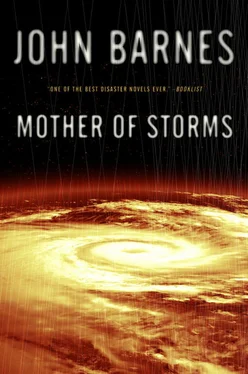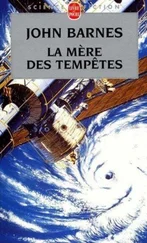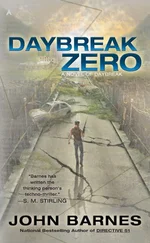It is probably fair to say that they are still fond of each other—indeed, more than ever before, they are the only people for each other.
All the while, Louie idly does his original tasks. The wafers of ice hurtle down over the Pacific, leaving their streaks of ice crystals to block the sun; as the crystal clouds roll toward the terminator line, and it creeps toward them, his masers flash, heating the crystals enough to dissociate the hydrogen and oxygen, leaving the lighter hydrogen to escape back into space.
It takes him a while to realize, but when he does, he begins to study himself. Somehow or other, throwing Frisbees is still fun. He would have thought that that was glandular, or at least in some pleasure center in the brain, and thus would be something he would not have anymore. But though he no longer feels the physical need for sex, or hunger, or satiation—he still has fun, and he’s still in love with Carla, and he’s still sad about the way some things in his life turned out.
The deepest mystery of all—he’s uploaded most of the available material from most libraries before he concludes that no one else knows any more than he does—is that he still laughs. In fact, the more he leams, the more he grows beyond mere human capacity, the more he laughs. He spends eight or nine seconds on that issue (the equivalent of a full conversation between the Athens of Pericles and Sevilla in the time of the great Caliphs, going on for a century) before he realizes it will not resolve, that it is beyond his understanding, and once he does, he laughs longer and harder than ever.
Carla interrupts his laughter, hears the joke, and laughs herself for a matter of some seconds. Then she fills him in on some of the scientific work she has been doing. After due study Carla has concluded that species loss due to the complete lack of ultraviolet light on the surface is unfortunate but not terribly large, that although many habitats have been destroyed and species lost with them, the extensive range of new habitats created will spawn a new panoply of species if only they are left undisturbed long enough. She has grabbed control of the planet’s banks, though they don’t know it yet, and she will move them toward the robot-based economy—one in which machines grind out what is necessary, and people make what it is good and healthy for them to make.
And she has decided quite definitely that the new wetlands, scour deserts, and mud plains will be left undisturbed.
Neither of them ever got along with people much, but people are what there is to work with, and now they understand a lot more about them than they used to. Louie and Carla Tynan work together, and they are content.
For amusement he proposes a question to her—will people react negatively to being well taken care of, once they realize who is doing it and how it’s being done?
Her answer is that though these people might, by the time people catch on they will be the sort of people whom the whole thing can be handed over to, if they really want to be bothered with their own economics and politics again.
It’s a good joke, to them, and there’s laughter on ten thousand antennas. They decide that good as the joke is, they can’t let Mary Ann in on it. Anyway, they have lots of time to talk about it, more time than all of human history, before the crowd reaches the mountaintop and stands at Monte Alban.
As Berlina Jameson sits huddled with the students in the Student Center, her arm around Naomi Cascade, her phone rings on the data line, and she uploads a group of files into the computer in her backpack.
She is surprised to find that the topmost ones are from the FBI and Department of Justice, and she isn’t supposed to have any of them. Having gotten her download, she gets out of everyone’s way, finds a corner, and begins to read.
It’s a series of orders pertaining to the assassinations, and though they are short and to the point, befitting a government still staggering back to its feet after the loss of most of its records, the remarkable thing is that they exist at all.
There are people they’re looking for, evidence they plan to seize—it will probably be the biggest trial case of reconstruction, and Berlina is already figuring out her angles on it for Sniffings, which she suspects is why they sent her this.
Her butt is uncomfortably cold on the tile floor, and she squirms a little. Naomi brings her a cup of hot soup, and she takes a too-big greedy gulp of it. The thing that’s fascinating is that somebody at some desk must have made a particular crusade out of this, because so many records were destroyed in Washington—right now on the opencast news President Grandma is asking all the postal employees to note down all the names that they can remember of people who were getting old-fashioned paper Social Security checks, so that they can reconstruct that part of the database. They’re also paying big rewards for anyone with illegal, hacked downloads of government databases, not so they can prosecute these people, but so they can buy back copies of their own data.
So whoever the obsessed nut is, this particular obsessed nut somehow or other had memorized every key name, date, place, document number, fled Washington to Charleston, and then sat down and wrote out these orders. She’s in awe—what a reporter this guy (or more likely, woman—to Berlina, thoroughness means woman) might have been!
Probably it’s whoever wrote this report titled “A Report on the Location of Key Witnesses And Evidence in the Assassinations of Harris Diem, Diogenes Callare, and Carla Tynan,” but unfortunately the signature line seems to have been deleted.
She reads on, fascinated. There’re a few issues of Sniffings to come out of this, no question, and just possibly she will be able to take up Hardshaw’s offer of an interview when things settle down a bit.
The short note from her bank records a bunch of deposits—some of the earlier editions of Sniflings are clear up to 100 million total viewers to date, and many of those viewers are now downloading more of the later editions (well, there isn’t much to do till the weather lets up, if they are inside and warm somewhere, so it makes sense, she thinks). For all practical purposes, she’s rich—and her bank is in nice, comfortable, safe, untouched Calgary.
She drops her computer into her pack again and looks out across the parking lot, where she sees the furious rain still pouring off her new van, surging tire-high around it. She thinks of the house she’ll buy, moving Naomi into it, the wealth to back the lifestyle she wants.
It is definitely an ill wind that blows no one good.
It has stopped raining and gotten warmer a little—just enough so that it feels good to have their clothes drying. Mary Ann Waterhouse is genuinely enjoying the day as herself, and she certainly hopes all her “passengers,” as she’s begun to think of the audience, are enjoying it as well.
Mary Ann , Carla’s voice thinks in her head. Got a moment for me?
Of course.
She senses, rather than hears in words, that Carla is telling everyone via the Passionet feed that Mary Ann is going to be off-line for a while, that there is something important and private to be dealt with, but that contact will be restored well before they reach Monte Alban. Then Carla is fully there. Let Jesse know we’ve got things to talk about.
“Carla’s come online and shut me off from Passionet,” she says to Jesse. God, he’s a handsome kid, walking beside her. They step carefully over a gushing runnel that has cut all the way through the pavement, only a long step wide but you have to make sure the other side will carry the weight, and Jesse reaches out and takes her hand as she takes the step. His hand is young and strong, smooth and warm, and she feels a little tingle again. He smiles into her eyes. “Hi, Carla, what do we need to talk about?”
Читать дальше












